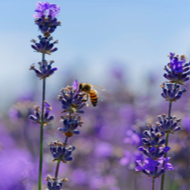
To mark the beginning of Bees' Needs Week (12 – 18 July), the Government are calling on the public to take action and care for bees and other pollinators.
Bees and other pollinators contribute the equivalent of more than £500 million per year to UK agriculture and food production by improving crop quality and quantity, and are essential to the environment.
Bees' Needs Week aims to highlight the importance of bees on UK ecosystems, and encourage people to take action to help them thrive.
For Bees' Needs Week 2021, Defra, along with the Royal Horticultural Society and Bumblebee Conservation Trust, among other green organisations, will work together to encourage everyone to take simple but effective measures to protect and help bees.
Environment Minister Rebecca Pow is urging everyone to take five simple steps to care for bees and ensure the continuation of their population. These are:
- grow more flowers, shrubs, and trees
- let your garden grow wild
- cut your grass less often
- don't disturb insect nests and hibernation spots
- think carefully about whether to use pesticides
“Everyone can help them flourish by leaving patches of garden to grow wild, growing more flowers, cutting grass less often, not disturbing insect nests, and carefully considering how we use pesticides.
“This is also one of the key messages of our recently launched ‘Plant for our Planet’ campaign - aimed at inspiring the public to support nature recovery by engaging in a variety of green activities to move us to a more sustainable future as we build back greener after the pandemic, and step up our efforts in tackling the climate crisis which is the focus of the COP26 summit.”
The chief executive of Natural England, Marian Spain, added: “Without nature we could not live. Pollinators including bees especially show us this; holding the environment together by moving pollen between plants, enabling whole systems to be sustained and replenished, and ensuring vital food supplies for wildlife and people.
“From changing the way you garden, to asking your council to leave long grass on road verges, parks and schools grounds, to using citizen science to learn even more about bees and other wildlife, we can all take part in Bees’ Needs Week and beyond.”
People are also being urged to get involved in the citizen science initiative, the Pollinator Monitoring Scheme (PoMS) insect counts, to help keep track of local bee and pollinator populations so that better support can be provided for them.



 The Veterinary Medicines Directorate (VMD) is inviting applications from veterinary students to attend a one-week extramural studies (EMS) placement in July 2026.
The Veterinary Medicines Directorate (VMD) is inviting applications from veterinary students to attend a one-week extramural studies (EMS) placement in July 2026.